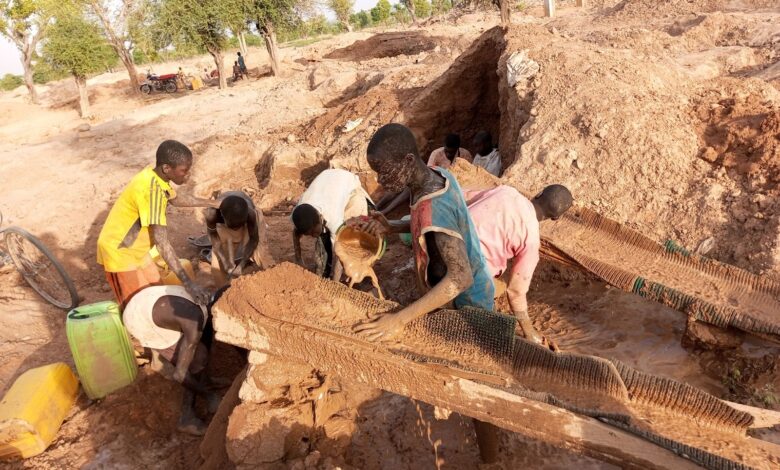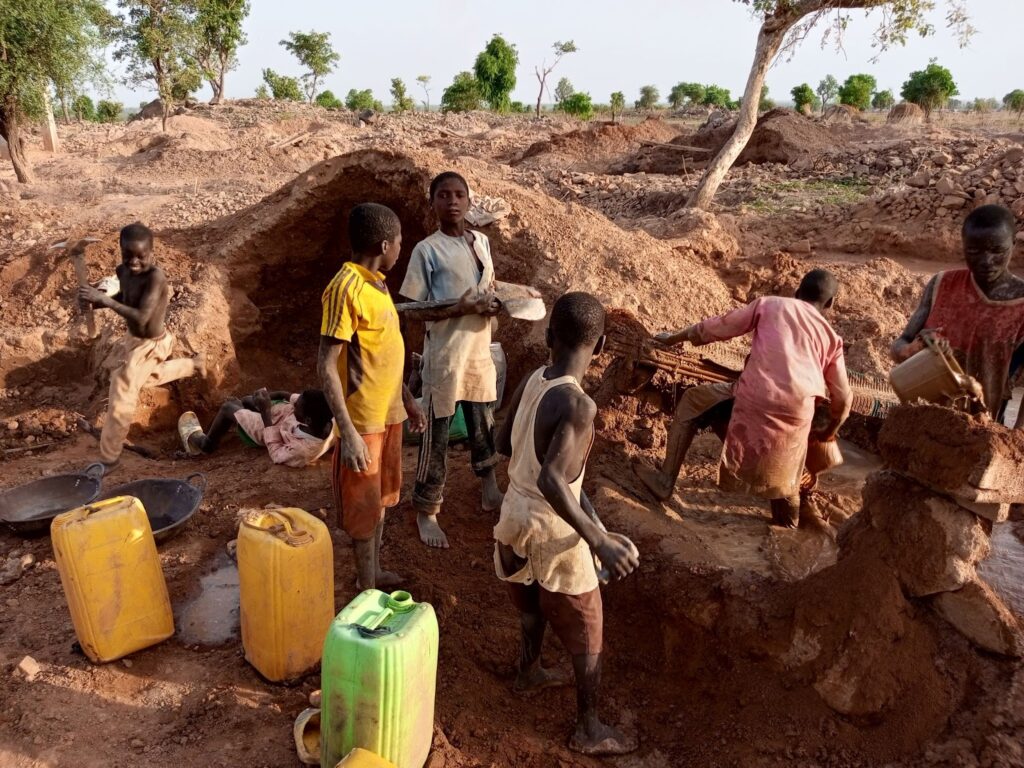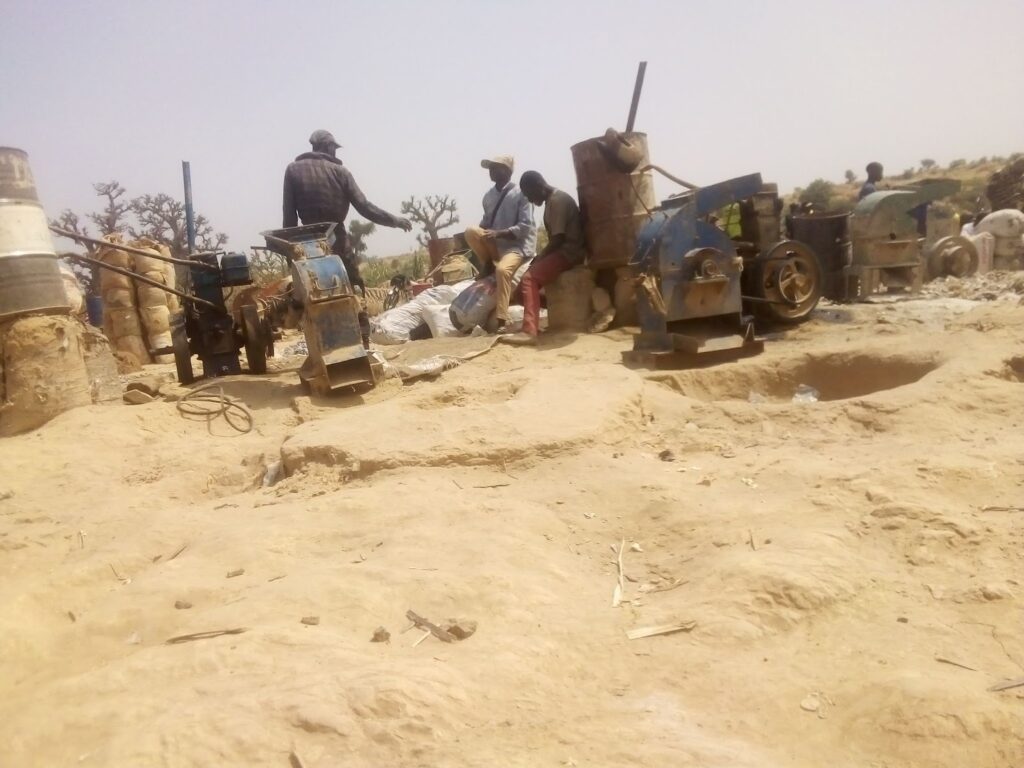Terror And Treasure: What Happens When Illegal Miners Have To Collaborate With Terrorists?
In many remote communities in Zamfara, North West Nigeria, locals are engaging in the desperate survival spree of illegal mining. Their lives hang in the balance amid the menacing grip of armed terrorists and the multiple bans on mining in the region by the state authorities. Their narratives unfold a chilling tale of terrorist financing.

Sani Black, a 49-year-old terror kingpin, is coercing helpless villagers to work on his illegally acquired mining sites in the Tunani and Duka communities of Zamfara, North West Nigeria.
The villagers say they have only two options: working on the terrorist’s mining site or being subjects of murder and mayhem. Trapped in the unholy trade, the locals say they have reported the sad development to the authorities, but it persists.
“We have been subjected to this hardened criminal since June 2023; he summons us almost every week to go to the mining site in the village to dig out gold and other precious stones for him,” says Akuti Mamman, one of Black’s victims. “The terror group stopped us from visiting our farms, forcing us to resort to a gold mining site found on the outskirts of our village.”
On their routine terror raids in the villages, the armed group, led by Sani Black, realised that villagers were always moving to a mining site whenever they invaded them. Some locals secretly operated the mining site, but the terrorists would take over the place. Merin Dutsi, a 52-year-old woman, recalls how she was supplying daily meals to miners on the site before the terror group took it from them.
“I would hold my local gun every day I visited the site where I sell food for people working there. But the bandits led by Black attacked us one day, killing three people and abducting seven others on the same day to take over the site,” she tells HumAngle.
At first, the villagers deserted the area over fear of terror attacks, moving to a more protected place in Zurmi town, but the terror chief would approach them later, assuring them of maximum protection once they agreed to work for him.
“We had suffered various forms of humiliation and disgrace with our wives and children and decided to desert the villages for other places,” Usmanu Kakale, one of the victims, recalls. After staying in Zurnmi town for three months with no job to feed his family, Usmanu says he and many others chose to survive by surrendering to the terrorists.
Elsewhere in the Danko-Wasagu area of the neighbouring Kebbi state, local miners and terrorists coexist. Bound by a precarious balance of trust and fear, the villagers said they are trapped in a world where treasure and terror are two sides of the same coin. In the surreal area, Danmakaranta and Mamman Yalo, two terrorist gang leaders, constitute a powerful terror camp and control the activities of miners who pay homage to them.
One day, Bashir, one of the local miners operating in the axis, and four of his friends got trapped in a mine hole while jostling to dig out some precious stones. Bashir managed to pull himself out of the dug hole with some virgin gold, leaving his friends in the dungeon behind. As he wept helplessly, hoping to see someone around to assist in saving his friends’ lives, Baleri, a notorious terrorist, suddenly appeared with his criminal gang, heavily armed.

Baleri was crisscrossing the area when he saw Bashir shedding tears. He first forced him to submit the gold stones he had gotten from the dug hole trapping his friends before offering to help them. The terror leader ordered his boys to rescue the trapped men, but two of them had died before they could be rescued while two others were unearthed from the hole, breathing heavily.
Bashir and his friends are not the only young persons cohabiting with terrorists in their survival sojourn in different mining sites in the region. Jafar Adamu, a 31-year-old, came from Ribah, in Kebbi State, but lives in several mining sites in Zamfara, especially at Tunani and Duka villages of Zurmi area.
Meanwhile, in Duka village, terrorists move around with guns slung across their shoulders. But Adamu and his friends would not mind mining and dining with the terrorists at the same time. The terrorists and the illegal miners agree on one thing:: there shall be peace once the latter pays homage to the former. Adaamu now permanently stays in Duka, a deserted terror zone, and boasts of living with the terrorists.
“We are familiar with almost all the gangs,” Adamu brags. “Although they rely on and demand more from us than the little we require from them. So we don’t care about or bother with them. We give them some fraction of the gold we dig and they give us protection in reciprocation against their fellow criminals who often come from elsewhere.”
The terrorists first came in military camouflage with their faces shrouded in masks, asking miners for cigarettes after shaking hands with them. Other times they casually asked the miners to send Kannywood films and songs to their phones via Bluetooth; the miners would often oblige. Adamu and his friends no longer fear the terrorists; they now share top secrets about the former’s illegal mining trade and the latter’s terror operations.
However, some displaced persons also find solace in mining as a coping mechanism after they are uprooted from their homes. For instance, when Bashar Bala fled his home in the Gasahula village in the Bukuyum area of Zamfara, mining seemed the only option to start afresh. He had sold his cattle and other valuables to pay his father’s ransom twice when he was kidnapped by two different terror groups.
“I woke up one day, had a rethink and finally realised that if we cannot farm to eat, certainly I have to go into mining to feed my displaced family members who are taking refuge in the Nasarawa-Burkullu area,” he says.
Things have since changed for good, Bala notes, recalling how he moved from grass to grace in the shortest possible time, through mining.
“I have now become a millionaire. My father, mother, and I visited the Holy Land. I have built a house, now own a car, and married two wives. I also now have a child. All the agony and frustrations are now things in the past,” he boasts.
“Western education with bundles of certificates means nothing to secure employment and be independent. To be honest, this mining work stops people from stealing or being involved in other criminal activities,” he also says.

In 2021, the Nigerian government placed a ban on mining activities over the established nexus between terrorists and illegal miners operating in the state. Before then, in 2020, HumAngle reported how Illegal miners worked as informants to terrorists, foiling the efforts of military operatives in the area. Meanwhile, in April 2019, authorities banned mining in communities affected by armed violence, but local miners ignored the order and formed alliances with different armed groups.
An independent researcher, Mallam Yunusa Zakari Ya’u, said local miners began to work in cahoots with terrorists when authorities declared mining activities illegal in Zamfara state. Ya’u, the Executive Director of the Centre for Information Technology and Development (CITAD), a Nigerian nonprofit firm, said the state and federal governments created room for violence spread by banning mining activities without providing alternative economic opportunities for artisanal miners.
Murtala Ahmed Rufa’i, another independent researcher and lecturer at the Usmanu Danfodiyo University, Sokoto, spoke to HumAngle about the relationship between miners and terrorists in the region. Rufa’i noted that the terrorists first came in contact with the local miners when they started their operations.
The indigenous miners, he adds, needed protection from attacks, making them cohabit with the terrorists.
“The bandits (terrorists) became so curious about what was happening in the locations of the precious stones. They developed interests in mining activities and some of the first-generation terror leaders in the region established a relationship with miners,” he said. “Besides the cattle rustling we know them for, the bandits were also into providing security to the miners, at a very high rate. In terms of money, the remuneration was just too good.”
It was at this point that the terrorists developed interests in the business themselves instead of serving as “the boys of the local miners.” In turn, the miners began to use the terrorists against their rivals in the mining sites, causing incidents of terrorists attacking a mining field and killing people, Rufa’i said.
Some of the miners, however, reecho Rufai’s words, saying terrorists have developed more than passing interests in illegal mining because it’s highly lucrative. One such miner, Dauda, reveals how terrorists had rubbed them off over N30 million worth of clean gold.
“They do not kill or harm us because they know they eat from us,” he says. “They cannot penetrate the ground holes and dig for gold. It is what we do that they get from.”
“They join us in almost everything we do, even though they do not put in the labour themselves. The reason we have to endure all these is because the forest and other bush areas are home to them. We are commoners, just visitors. So we must be tactical and careful in fighting them,” Adamu, one of the local miners, cuts in.
Although Aminu realises that the armed group he now works with on mining sites had once attacked his village in 2021, killing his friends and relatives, he continues to dine and wine with them for financial gains.
Support Our Journalism
There are millions of ordinary people affected by conflict in Africa whose stories are missing in the mainstream media. HumAngle is determined to tell those challenging and under-reported stories, hoping that the people impacted by these conflicts will find the safety and security they deserve.
To ensure that we continue to provide public service coverage, we have a small favour to ask you. We want you to be part of our journalistic endeavour by contributing a token to us.
Your donation will further promote a robust, free, and independent media.
Donate HereStay Closer To The Stories That Matter




